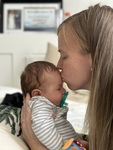
Michelle is a young adult who was diagnosed with ampullary cancer three weeks after having her first child. She recalls the experience of receiving a rare cancer diagnosis from her doctor’s online portal alongside her husband. “We Googled enough to know the diagnosis, but not enough to go down the black hole of fear the Internet will provide,” she shared. “We sat next to each other, we cried and we couldn’t focus on anything, yet our newborn still required our attention.”
Her treatment plan involved surgery that removed her gallbladder as well as part of her pancreas and small intestine, which successfully removed the tumor. “In a three-week period, I was diagnosed with and freed from cancer, all while becoming a new mom.”
While surgery was an effective treatment, Michelle’s recovery period was physically difficult. “I got to go home after a week and it took four more weeks to feel capable of everyday tasks,” she said. “At one point, walking half a block and back was a major accomplishment. I was cleared to pick up my baby after five weeks post-op and it is still one of the best memories.”
Michelle also received chemotherapy administered by her health care team as an “insurance plan” to determine that no more cancerous cells could be detected, which resulted in side effects and fatigue. “Some days, I questioned if I should be doing chemo because surgery was successful, and on other days, chemo was the only thing that made sense.”
As a young parent with a rare cancer diagnosis, Michelle faced specific challenges from feelings of loneliness and disconnection to navigating fertility considerations and finding a new job. To cope with these challenges, Michelle relied on her faith and her support network. “My go-to thoughts on the hardest days were any variation of prayers, wisdom, worship songs and encouragement people shared with me during those times.”
One of the most helpful forms of support Michelle received from her community was helping with her baby, especially when she was undergoing chemotherapy. “The people who showed up and cared for the baby and did whatever the baby needed were the most helpful because it was such a unique situation where of course I need care, but I have a newborn who needs a lot of attention.”
CancerCare’s support groups also played an important role in her experience. “Joining a CancerCare young adult survivorship support group has been pivotal in my healing. It helped me understand what survivorship is, validated all the emotions I was having and connected me to people in similar life stages.”
Michelle has words of wisdom for young adults with cancer who may feel isolated from other people their age. “Just like what I’m going through is rare for young adults, my young adult community also doesn’t know how to respond to someone going through it, so there’s a level of grace that has to happen,” she shared. “The more I talk about it, the more they can understand it. You have to talk about it and don’t let the frustrating emotions deter you from being open with people.”
During her survivorship experience, Michelle wants to give back by volunteering with an organization helping parents diagnosed with cancer. She also hopes to get involved with new communities helping people in similar situations as she knows she isn’t alone.
“There’s a lot of amazing support for artistic people, people my age, people with certain cancer diagnoses, but because it’s rare, because I’m a parent and because I’m following the Christian faith, I have not found that community. I do have aspiration to either build that community or find it and help build it because it was so huge for me.”
